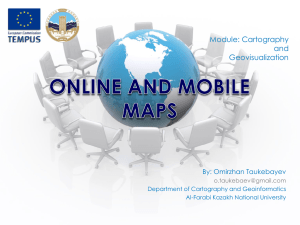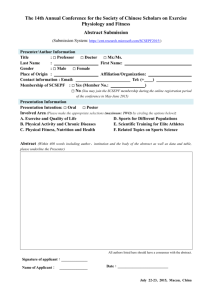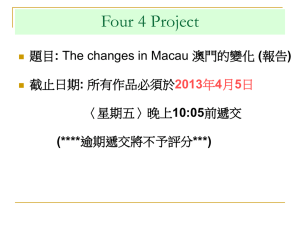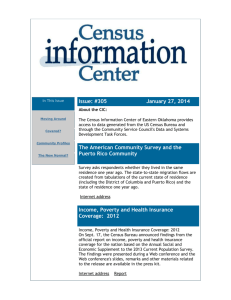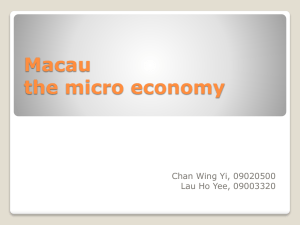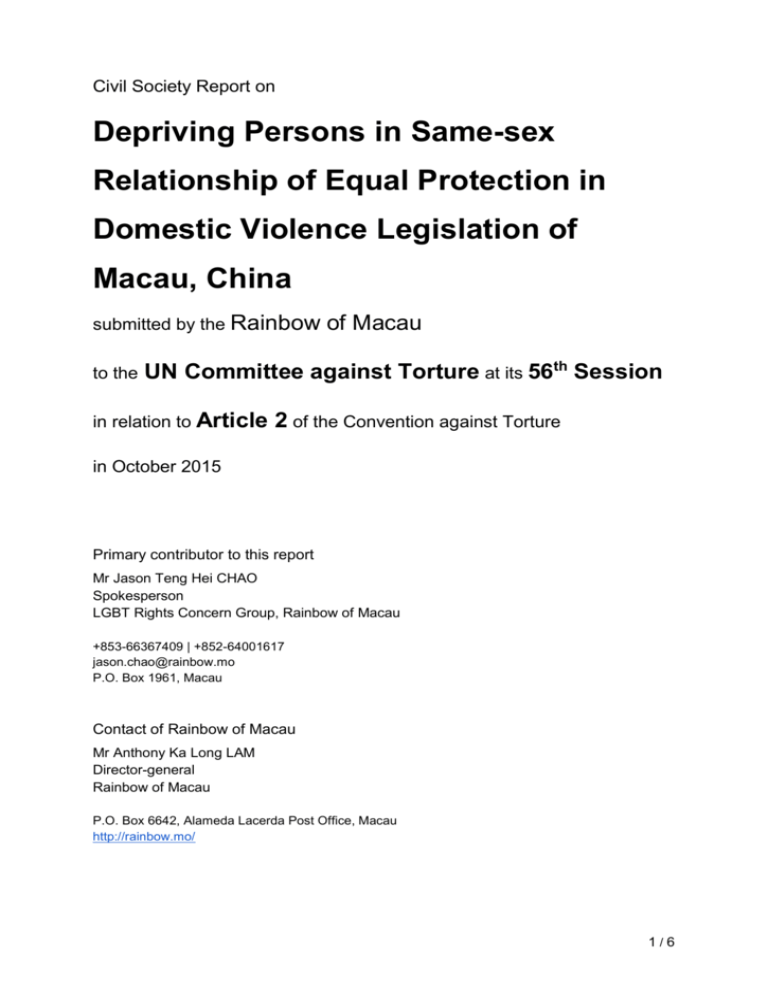
Civil Society Report on
Depriving Persons in Same-sex
Relationship of Equal Protection in
Domestic Violence Legislation of
Macau, China
submitted by the Rainbow
to the
of Macau
UN Committee against Torture at its 56th Session
in relation to Article
2 of the Convention against Torture
in October 2015
Primary contributor to this report
Mr Jason Teng Hei CHAO
Spokesperson
LGBT Rights Concern Group, Rainbow of Macau
+853-66367409 | +852-64001617
jason.chao@rainbow.mo
P.O. Box 1961, Macau
Contact of Rainbow of Macau
Mr Anthony Ka Long LAM
Director-general
Rainbow of Macau
P.O. Box 6642, Alameda Lacerda Post Office, Macau
http://rainbow.mo/
1/6
Summary
At the moment of submitting this report, the Prevention and Correction of Domestic
Violence Bill is being deliberated at the committee stage in the Legislative Assembly
of Macau.
The Government of the Macau SAR1 of the PRC2 (hereinafter referred to as “the
Government” for the sake of simplicity) acknowledges that the present Penal Code3
has failed to provide adequate protection to victims of domestic violence.
In 2011, the Government launched a public consultation on a law proposal4 against
domestic violence. In the first version of the bill introduced by the Government, a
reference to cohabitants of the same-sex was included in the definition of “family
members”. However, in November 2012, the Government announced that “samesex cohabitant” would be removed from scope of the domestic violence bill.
Following the decision to drop the protection of same-sex cohabitants, the Rainbow
of Macau5 repeatedly petitioned the Government to restore “same-sex cohabitant” in
the law proposal but to no avail. The Government claimed that listing same-sex
cohabitants as family members would be inconsistent with the legal system of
Macau.
In January 2015, the Government presented to the legislature the second version of
domestic violence bill without a reference to same-sex couples. On 13 January,
2015, the legislature approved the general principles of the bill and moved it to the
committee stage.
Rainbow of Macau requested in writing a meeting with the standing committee
assigned to deliberate on the details of the bill. Not only did the Chair of the
committee turn down the meeting request but also members of the committee have
shown a lack of interest in the issue of the absence of protection of same-sex
couples under the bill.
The urge by UN entities for actions to protect lesbian, gay, bisexual, transgender and
intersex (LGBTI) individuals against violence and discrimination may have not been
taken seriously by the Government.
Rainbow of Macau requests the Committee against Torture to ask the
Government to ensure the same level of legal protection against domestic
violence to be made available to all persons in an intimate relationship
irrespective of sexual orientation.
“Special Administrative Region” in full
“People’s Republic of China” in full
3
may also be cited as “Criminal Code” in other sources
4
interchangeably referred to as “bill” in this report
5
formerly known as “Macau LGBT Rights Concern Group”
1
2
2/6
Background
In 2011, the Social Affairs Bureau (IAS) of the Government launched a consultation
on its proposed “Combating Domestic Violence Law”6. The Government defined
relationships between perpetrators (“the agent”) and victims of domestic violence in
the initial version of the bill as follows:
(translation from the Portuguese text7)
(1) The ascendants or descendants, e.g., parents, children, grandparents and
grandchildren, etc.;
(2) The spouse or former spouse and their ancestors and descendants, who
cohabit;
(3) The person with whom the agent maintains or has maintained a
relationship analogous to that of spouses, and their ancestors and
descendants, who cohabit;
(4) A person of the same sex with whom the agent maintains or has
maintained an intimate relationship, and their ancestors and descendants,
who cohabit;
(5) The person with whom the agent has common children, and (6) The
person with diminished capacity by reason of age, disability, illness,
pregnancy or economic dependence, which cohabits with the agent.
In late November 2012, the IAS published a concluding report on the public
consultation. In the report, it was announced that the “same-sex cohabitant” element
in the bill would be removed because of "complex issues involving traditional
culture, morality, religions and values” and “a lack of social consensus on same-sex
couples being seen as family members". The IAS mentioned that 12 suggestions
had been received during the consultation period. However, the content of the “12
suggestions” has not been made available to the public.
Macau LGBT Rights Concern Group8 was the first group to openly question the
Government’s withdrawal of protection and to advocate the restoration of the
paragraph on same-sex cohabitant in the bill. Later, Rainbow of Macau9 argued that
“the lack of social consensus” might not be an excuse to circumvent “the
controversy” as the Government has obligation under international law to eliminate
later renamed to “Prevention and Correction of Domestic Violence Law”
1) A ascendente ou descendente; 2) Ao cônjuge ou ex-cônjuge e respectivos ascendentes e
descendentes, com quem coabitem; 3) A pessoa com quem o agente mantenha ou tenha mantido
uma relação análoga à dos cônjuges, e respectivos ascendentes e descendentes, com quem
coabitem; 4) A pessoa do mesmo sexo com quem o agente mantenha ou tenha mantido uma
relação íntima, e respectivos ascendentes e descendentes, com quem coabitem; 5) Ao progenitor
de descendente comum em 1.º grau; 6) A pessoa com capacidade diminuída, em razão da idade,
deficiência, doença, gravidez ou dependência económica, que com o agente coabite;
8
the first ever advocacy group for LGBT community in Macau
9
the successor to “Macau LGBT Rights Concern Group”
6
7
3/6
discrimination on sexual orientation ground in light of resolution A/HRC/17/L.9/Rev.1
adopted by the UN General Assembly.
In good faith, Rainbow of Macau assumed that the Government would take up a role
in combating prejudice. Rather, to further justify the decision of removal, the
Government gathered some new technical-legal arguments against the inclusion of
same-sex relationship. The IAS claimed that a piece of legislation considering
same-sex couples as “family members” would be “inconsistent with the legal system
of Macau” because there was no legal recognition of same-sex marriage in Macau.
Rainbow of Macau refuted the Government’s new arguments by pointing out the
existing domestic violence laws with same-sex relationship in scope in Hong Kong
and Taiwan where cultures were very close to Macau’s one and same-sex marriage
was not yet legalised.
It was very regrettable that the Government stayed with the “consistency with legal
system” argument despite a year-long dialogue between activists of Rainbow of
Macau and the Government officials.
Given the reality of stigmatisation, persons in a same-sex relationship are known to
be vulnerable to a form of domestic violence in which one party may easily coerce
another party (victim) by threatening to reveal10 the victim’s sexual orientation to the
victim’s family or employer. Victims may not report the case to the police in fear of
further exposing his / her sexual orientation. Without the measures promised in the
domestic violence bill such as confidentiality and mandatory intervention of
Government social workers, same-sex couples will remain vulnerable to this form of
coercion.
Rainbow of Macau has informed the Government of the joint statement11 published
by twelve UN agencies in September 2015 calling for an end to violence and
discrimination against lesbian, gay, bisexual, transgender and intersex (LGBTI)
adults, adolescents and children, and for actions to protect them against abuses.
The joint statement resonates with the demand for the inclusion of same-sex
relationship in the scope of domestic violence legislation.
“[E]nding marginalization and exclusion of LGBT people is a human rights priority –
and a development imperative,” UN Secretary-General Ban Ki-moon stressed in a
speech12 delivered on 29 September 2015.
Rainbow of Macau worries that the Government’s withdrawal of protection of
persons in same-sex relationship against domestic violence will inevitably send a
wrong message to the communities that exclusion of LGBTI people is justifiable.
an act commonly referred to as “outing”
http://www.ohchr.org/Documents/Issues/Discrimination/Joint_LGBTI_Statement_ENG.PDF
12
http://www.un.org/sg/statements/index.asp?nid=9064
10
11
4/6
The Issue
In January 2015, the government presented the Prevention and Correction of
Domestic Violence Bill13 to the Legislative Assembly. The new definition of “family
members” was stated as:
(translation from the Portuguese text14 of the bill)
spouse or former spouse of the agent, their parents or relatives in the direct
line, siblings, adoptive parents or adopted children of the agent or spouse
own, person with whom the agent has a guardianship relationship, person
with whom the agent living in a similar situation to that of spouses and
persons of diminished capacity cohabiting with the agent and who are under
their care or protection due to age, illness, pregnancy or physical or mental
disability.
The clause underlined above refers to unmarried heterosexual couples. The way it
was put is almost identical to how de-facto marriage is defined15 in the Civil Code of
Macau. Although the clause appears gender-neutral, the Government has clarified
that the term “spouses”16 as in the clause is a reference to the definition of marriage
in the Civil Code and is not applicable to same-sex relationship. In other words, the
new definition was expanded to include opposite-sex couples regardless of marital
status while same-sex couples remain excluded.
The Government’s decision to deprive same-sex couples17 of the same level of legal
protection that their heterosexual counterparts will be entitled to under the domestic
violence bill constitutes a de facto discrimination.
At the time of finalising this report, the domestic violence bill is being discussed
article-by-article by the First Standing Committee18 (FSC) of the Legislative
Assembly. Rainbow of Macau requested a private meeting with the FSC in hope to
explain to its members in person the compelling reasons behind the demand for
restoring the reference to same-sex relationship in the scope of domestic violence
legislation. Rainbow of Macau was deeply disappointed at the request being turned
down by the Chairwoman of the FSC. She said that the FSC had learnt Rainbow of
Macau’s opinion on same-sex relationship from written communication.
13
Full text of the bill in Portuguese http://www.al.gov.mo/proposta/vio-domestica/proposta.pdf
The definition of “Family Members” is stated in paragraph 2 of Article 2 in the Portuguese text as
“cônjuge ou ex-cônjuge do agente, seus parentes ou afins na linha recta, irmãos, pais adoptivos ou
filhos adoptivos do próprio agente ou do cônjuge, pessoa com quem o agente tenha uma relação de
tutela, pessoa com quem o agente viva em situação análoga à dos cônjuges, e pessoas de
capacidade diminuída que coabitam com o agente e que se encontram sob seu cuidado ou protecção
por razões de idade, doença, gravidez ou deficiência física ou psíquica.”
15
Articles 1471 - 1472 of Civil Code define de-facto marriage as relationship between two persons
living voluntarily in conditions similar to those of spouses; under the Domestic Violence Bill, persons
living in conditions similar to those of (heterosexual) spouse regardless of years of cohabitation are
considered as “family members” thus are under protection
16
“cônjuges” in Portuguese
17
mostly unmarried or their marriage not recognised in Macau
18
“1ª Comissão Permanente” in Portuguese
14
5/6
Conclusion and Recommendation
Although the Government has declared the policy of “zero tolerance to domestic
violence” and has claimed to respect LGBTI people, the denial of equal protection
against domestic violence suggests the otherwise.
The Government may have foreseen an objection from some sectors of the society
to the inclusion of same-sex relationship in the proposed domestic violence law. The
Government’s insistence on the withdrawal of same-sex relationship from the bill
suggests a lack of genuine interest in fulfilling its obligation under the Convention
against Torture by taking all effective measures to prevent acts of torture.
Rainbow of Macau recommends the Committee against Torture to:
1. question the government of Macau, China the decision to knowingly deprive
same-sex unmarried couples of the same level of legal protection which
opposite-sex unmarried couples will be entitled to; and
2. urge the government of Macau, China to take all necessary actions, inter alia,
revising the law proposal and informing members of the legislature and the
public of the obligation under international law, to ensure that same-sex
couples shall be entitled to effective and equal protection once the proposed
“Prevention and Correction of Domestic Violence Law” comes into force.
- End -
6/6

